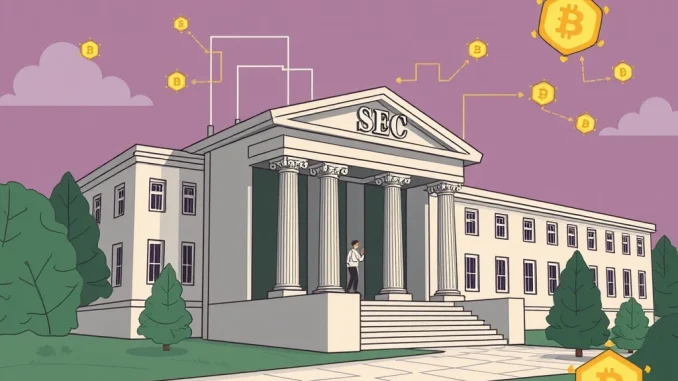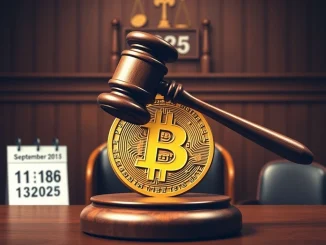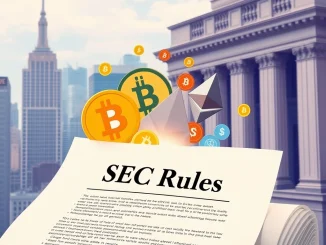
The U.S. Securities and Exchange Commission (SEC), often seen as a key player in the crypto space, is reportedly considering a significant move that could reshape how digital assets interact with traditional finance. SEC Commissioner Hester Peirce recently revealed discussions about a potential SEC DLT exemption order specifically for distributed ledger technology (DLT) and tokenized securities.
Understanding the Potential SEC DLT Exemption
As reported by Wu Blockchain, Commissioner Peirce indicated the agency is looking into an order that would allow companies to leverage distributed ledger technology for issuing, trading, and settling securities. This potential order could also facilitate the operation of innovative trading systems designed for eligible tokenized securities. This news signals a potential shift in the SEC’s approach to crypto regulation, exploring ways to integrate this technology rather than solely focusing on enforcement.
What Exactly Are DLT and Tokenized Securities?
Let’s break down these key terms simply:
- Distributed Ledger Technology (DLT): Think of DLT, like blockchain, as a shared, immutable database distributed across multiple computers. It records transactions securely and transparently without a single point of control.
- Tokenized Securities: These are digital representations of traditional securities (like stocks, bonds, or real estate) issued and managed on a DLT. Each token represents ownership or a right associated with the underlying asset. They aim to bring the benefits of DLT to traditional finance.
Why Is This SEC DLT Exemption Being Considered?
Current securities laws weren’t designed for the speed and nature of DLT-based transactions. Existing regulations around clearing, settlement, and custody often create friction for assets native to a blockchain. An exemption could provide much-needed regulatory clarity, potentially allowing innovation in the use of distributed ledger technology for securities to flourish within defined boundaries.
The Role of Hester Peirce at the SEC
Commissioner Hester Peirce SEC is often dubbed “Crypto Mom” for her more forward-thinking views on digital assets. She has consistently advocated for regulatory approaches that accommodate innovation. Her previous “Safe Harbor” proposal aimed to provide projects with a temporary exemption period to build decentralized networks without immediate fear of enforcement actions. This consideration of a DLT exemption aligns with her long-held position on crypto regulation and fostering innovation.
Potential Benefits of the Exemption for Tokenized Securities
If the SEC moves forward with this, it could unlock significant potential:
- Increased Efficiency: Faster settlement times (potentially seconds/minutes vs. days) for tokenized securities.
- Reduced Costs: Lower overheads by potentially removing intermediaries in issuance and trading.
- Greater Accessibility: Potentially fractional ownership of high-value assets, democratizing investment.
- Enhanced Transparency: An immutable, auditable record of ownership and transactions on the ledger.
- Innovation: Encouraging new business models, trading platforms, and financial products built on DLT.
What Challenges Does the SEC Face with Crypto Regulation and DLT?
While the potential is significant, the SEC must navigate complex issues:
- How to ensure robust investor protection in a decentralized environment?
- How will custody and asset recovery work effectively if private keys are lost or compromised?
- Ensuring market integrity and preventing manipulation on DLT-based platforms.
- Clearly defining which tokenized securities qualify for any potential exemption and under what conditions.
- Addressing interoperability challenges between different DLT networks and traditional financial systems.
- Mitigating potential security risks inherent in new technologies and smart contracts.
What’s Next for the SEC DLT Exemption?
This announcement from Hester Peirce SEC is a crucial step, but it’s just the beginning of the conversation. The SEC would need to propose specific rules or orders outlining the details of any exemption. These proposals would then typically be open for public comment before being finalized. The specifics – who qualifies, for what activities, and under what conditions – will be critical for determining the true impact on the market for tokenized securities and the future of distributed ledger technology in finance.
Conclusion: A Glimmer of Regulatory Clarity?
The news that the SEC is considering an exemption order for distributed ledger technology and tokenized securities, as highlighted by Commissioner Hester Peirce SEC, offers a glimmer of hope for greater regulatory clarity in the U.S. This potential SEC DLT exemption could be a breakthrough moment, paving the way for increased adoption, efficiency, and innovation in the financial markets. While challenges remain regarding comprehensive crypto regulation, this development suggests a willingness within parts of the agency to explore pathways for integrating these powerful new technologies rather than solely focusing on enforcement. Market participants should stay tuned for further details from the SEC as this important discussion evolves.



